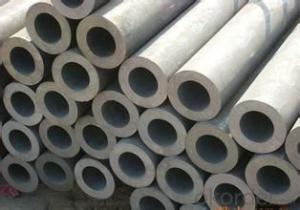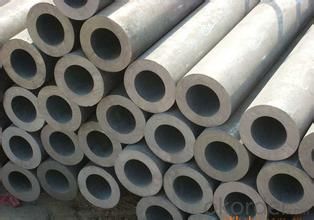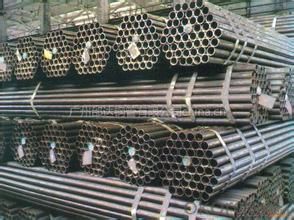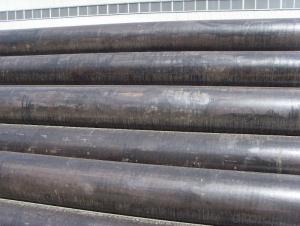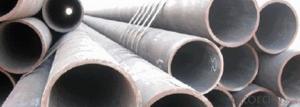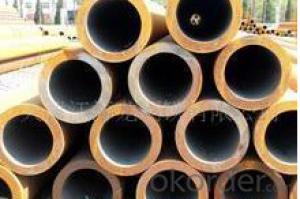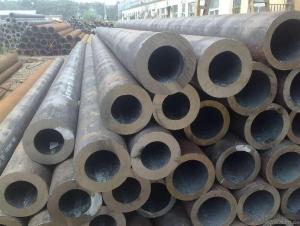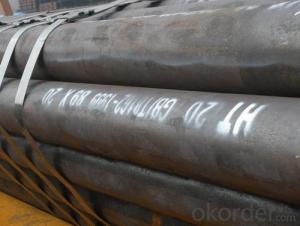Steel pipe for carbon seamless ,45# , Cnbm
- Loading Port:
- Qingdao
- Payment Terms:
- TT OR LC
- Min Order Qty:
- 10 pc
- Supply Capability:
- 30 pc/month
OKorder Service Pledge
OKorder Financial Service
You Might Also Like
Quick Details
Thickness: 6 - 50 mm Section
Shape: Round,
Outer Diameter: 33 - 600 mm
Secondary Or Not: Non-secondary
Application: Fluid Pipe
Technique: Hot Rolled,Hot Rolled,Cold Drawn,Hot Expanded Certification: API Surface Treatment: Beveled end or plain end or varnished as per buyer
Special Pipe: API Pipe Alloy Or Not: Non-alloy
Brand Name: XPY(Xinpengyuan)
Length: 6-12m or according to clients' requirements
Standard: BS 3059-2,JIS G3454-2007,GB 5310-1995,GB 3087-1999,GB/T 8163-1999,GB/T 8162-1999,GB 6479-2000,DIN 1629/3,DIN 2448,ASTM A106-2006,ASTM A53-2007,API 5CT,API 5L,BS,JIS,GB,DIN,ASTM,API
Mechanical properties
standard | grade | Tensile strength(MPA) | yield strength(MPA) |
ASTM A106 | A | ≥330 | ≥205 |
B | ≥415 | ≥240 | |
C | ≥485 | ≥275 |
Bundles or loose, each bundles with 8 steel strips and
nylon slings wrapped with water proof plastic cloth.
We also pack our products according to customer’s requirement
- Q: How are steel pipes used in the manufacturing of conveyor systems?
- Steel pipes are commonly used in the manufacturing of conveyor systems to provide a durable and reliable structure for transporting various materials. They are typically used as the main framework for the conveyor system, supporting the conveyor belt and other components. Steel pipes are known for their strength and resistance to wear and tear, making them ideal for handling heavy loads and withstanding continuous use. Additionally, steel pipes can be easily shaped and welded, allowing for customization and flexibility in conveyor system design.
- Q: Why can't stainless steel be put together with carbon steel tube?
- The bimetallic corrosion is terminated only when one of the three conditions is changed. Galvanic corrosion is related to the contact area of bimetal and the greater the contact area. Corrosion is less. The driving force of galvanic corrosion is the potential difference.[galvanic corrosion] refers to two or more than two kinds of electrode potential of metal in the corrosive medium, and contact with each other caused by electrochemical corrosion, also known as contact corrosion or double metal corrosion.
- Q: What are the different types of steel pipe coatings for underground gas pipelines?
- There are several types of steel pipe coatings commonly used for underground gas pipelines, including fusion-bonded epoxy (FBE) coating, polyethylene (PE) coating, and polyurethane (PU) coating. Each coating provides different levels of protection against corrosion and abrasion, ensuring the longevity and integrity of the gas pipeline.
- Q: How do you calculate the flow rate through a steel pipe?
- Several factors need to be considered in order to calculate the flow rate through a steel pipe. The crucial factors include the pipe's diameter, the pressure difference across the pipe, and the properties of the fluid flowing through it. Accurate measurement of the inside diameter of the steel pipe is the first step. This measurement is vital as it determines the cross-sectional area through which the fluid flows. Ensure that the units used for the diameter measurement are consistent with the units used for other measurements. Next, determine the pressure difference across the pipe. This can be accomplished by measuring the pressure at two points along the pipe, typically at the inlet and outlet. It is important to take the pressure measurements at the same height in order to avoid any discrepancies. The pressure difference is usually given in units of pressure, such as psi, kPa, or bar. Once you have the diameter and pressure difference, you can utilize either the Bernoulli equation or the Darcy-Weisbach equation to calculate the flow rate. The Bernoulli equation establishes a relationship between the pressure difference and the fluid's velocity. However, this equation assumes ideal conditions and overlooks factors like friction losses, viscosity, and turbulence. On the other hand, the Darcy-Weisbach equation is more accurate as it considers these factors. To employ the Darcy-Weisbach equation, you must be aware of the fluid's properties that flow through the pipe, such as density and viscosity. These properties can be determined either through experimentation or by referring to literature values. After gathering all the necessary information, you can use the Darcy-Weisbach equation: Q = (π/4) * D^2 * √[(2 * ΔP) / (ρ * f * L)] Where: Q represents the flow rate, measured in cubic meters per second or any other consistent units. D is the diameter of the pipe, measured in meters or any other consistent units. ΔP is the pressure difference across the pipe, measured in Pascals or any other consistent units. ρ is the density of the fluid flowing through the pipe, measured in kilograms per cubic meter or any other consistent units. f signifies the friction factor, which relies on the Reynolds number and the roughness of the pipe. L represents the length of the pipe, measured in meters or any other consistent units. By substituting the appropriate values for all the variables, you can accurately calculate the flow rate through the steel pipe.
- Q: What is the role of steel pipes in the aerospace industry?
- Steel pipes play a crucial role in the aerospace industry as they are used in various applications such as aircraft manufacturing, engine components, and fuel systems. These pipes are known for their high strength, durability, and resistance to extreme temperatures and pressure. They provide a reliable conduit for fluids, gases, and hydraulic systems, ensuring efficient operations and safety in aircraft. Additionally, steel pipes are utilized in structural components like landing gear, frames, and support structures due to their ability to withstand heavy loads and maintain structural integrity under dynamic conditions. Overall, steel pipes are essential in the aerospace industry for their versatility and reliability in critical systems and structures.
- Q: What are the different types of pipe connections used with steel pipes?
- There are several types of pipe connections commonly used with steel pipes. Some of the most common types include: 1. Threaded connections: These connections involve threading the ends of the pipe and using threaded fittings to connect them. This type of connection is typically used for smaller diameter pipes and is easy to install and dismantle. 2. Welded connections: Welding is a common method used to connect steel pipes. It involves joining the ends of the pipes together by melting the metal and fusing them together. Welded connections are durable and strong, making them suitable for high-pressure applications. 3. Flanged connections: Flanges are used to connect pipes by bolting them together. Flanged connections are commonly used in industrial applications and are often used for larger diameter pipes or when the pipe needs to be easily disassembled for maintenance purposes. 4. Grooved connections: Grooved connections involve using grooved fittings that have grooves on the inside to connect the pipes. These connections are often used in fire protection systems and are quick and easy to install. 5. Compression connections: Compression fittings are used to connect steel pipes by compressing a ferrule onto the pipe. This type of connection is commonly used in plumbing applications and provides a tight and secure seal. 6. Mechanical connections: Mechanical connections, such as couplings or clamps, are used to connect steel pipes without the need for welding or threading. These connections are often used for temporary or emergency repairs. Each type of pipe connection has its advantages and disadvantages, and the choice of connection method will depend on factors such as the application, pipe size, and installation requirements. It is important to carefully consider these factors to ensure a secure and reliable connection for steel pipes.
- Q: What are the safety precautions for handling steel pipes?
- Some safety precautions for handling steel pipes include wearing appropriate personal protective equipment such as gloves, safety glasses, and steel-toed boots. It is also important to use proper lifting techniques to prevent strain or injury, as steel pipes can be heavy. Additionally, ensuring a clear and organized workspace, as well as securing the pipes properly during transportation, can help prevent accidents or damage.
- Q: What are the uses of seamless steel tubes?
- A large number of pipes used for conveying fluids, such as pipelines for transporting petroleum, natural gas, gas, water, and certain solid materials.
- Q: Can steel pipes be used for high-pressure applications?
- Yes, steel pipes can be used for high-pressure applications. Steel pipes are known for their strength and durability, making them suitable for handling high-pressure fluids, gases, or steam in various industries such as oil and gas, construction, and manufacturing. They are designed to withstand the high internal pressure and are commonly used in pipelines, steam systems, and hydraulic systems where the pressure requirements are significant.
Send your message to us
Steel pipe for carbon seamless ,45# , Cnbm
- Loading Port:
- Qingdao
- Payment Terms:
- TT OR LC
- Min Order Qty:
- 10 pc
- Supply Capability:
- 30 pc/month
OKorder Service Pledge
OKorder Financial Service
Similar products
Hot products
Hot Searches
Related keywords
